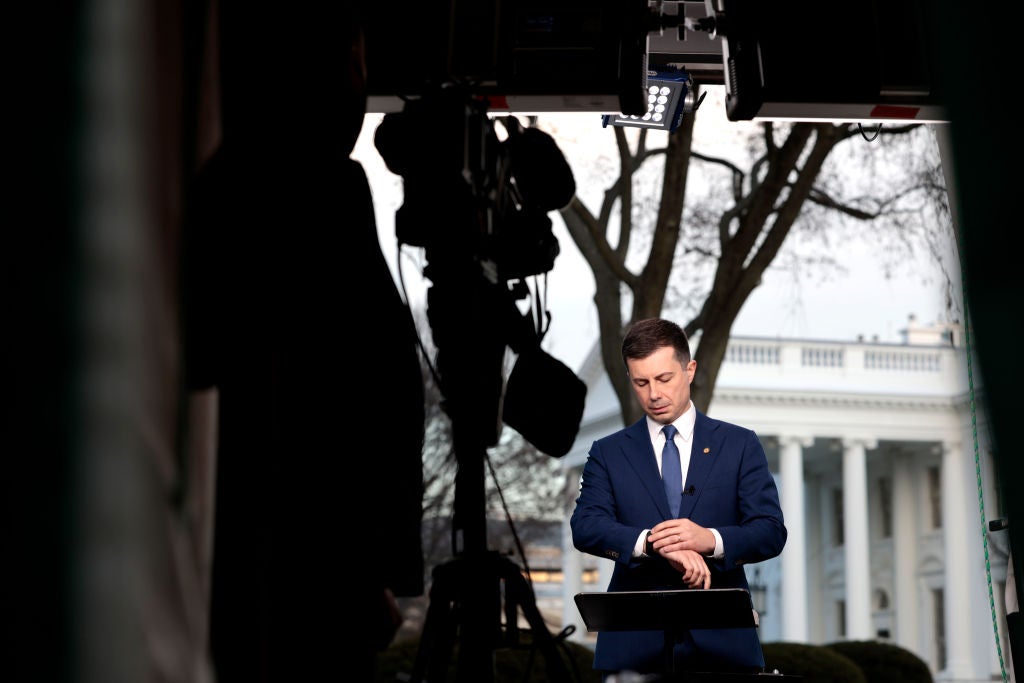Air travel was a mess this summer. Can airlines shape up in time for the holiday rush?
Old issues persist, but Americans have lost touch with familiar problems, experts tell John Bowden


Americans griping over summer travel plans torn asunder by a cancelled flight are focusing their blame on US airlines.
But in conversations about a summer of uncertainty for many flyers, experts who agreed with that theory had another message as well: Chill out.
Following a devastating global pandemic that all but shuttered both domestic and international travel, the US airline industry is bouncing back, thanks in no small part due to a $25bn bailout (plus more in financial assistance) from the federal government. But as travelers return to airports for planned vacations put aside by Covid-19, experts worry that a kind of selective memory has set in among flyers beset with familiar problems.
The past few months have been a time of great angst for travelers, with both social media and traditional news sources abuzz with complaints of delayed and cancelled flights and various targets to blame. Most have agreed that airlines bear the brunt of the blame for cancellations, pointing to staff shortages amid a time of very public protests by pilots, flight attendants and other air travel industry workers over wages, working conditions and hours.
But some also opined in conversations with The Independent that some travellers are missing the mark by exaggerating real concerns due to a kind of “Covid memory loss” that many developed during a pandemic which left most stranded at home.
There are certainly some reasons for travellers to be annoyed. Delays are up, not just from 2021 but from every year since 2014. Cancellations are up too, the highest rate in a decade with the exception of 2020, when a staggering 10.39 per cent of US flights were cancelled thanks to the pandemic.
But the reasons for both can be explained, and some of those explanations will likely be of little help to beleaguered American travellers.
Statistics shared by the Federal Aviation Authority (FAA) indicate that the vast majority of delays so far in 2022 have been caused by the least-controllable variable of them all: the weather. And the volume of flights at airports — as in, too many flights — is the second-highest reason. Staffing shortages, which more often results in cancellations than delays, accounted for just one in 10 delayed flights this year (so far).
Some travellers, said the head of the nation’s largest flight attendant’s union, have forgotten what it means to be rained out.
“I think part of this is lack of memory or a disruption from the pandemic with remembering how difficult things can be in summer air travel operations,” Sara Nelson of the Association of Flight Attendants-CWA (AFA) told The Independent.
When it comes to flights being cancelled outright, the problem is a bit more clear-cut, but only barely: Staffing shortages are affecting flight crews, including flight attendants, airport staff and pilots. Maybe.
Longstanding contract disputes that left many flight attendants in the US unhappy with their working conditions were exacerbated by the pandemic, Ms Nelson told The Independent, but a bizarre dispute has emerged over how widespread the shortage is within the industry.
The AFA, as well as the CEOs of major US airlines and even Department of Transportation Secretary Pete Buttigieg all agree that it extends to pilots, where they say there is a difficulty in both hiring and retaining employees. But the head of the largest airline pilot’s union disagrees, citing data showing more pilots being trained this year than in 2019, one year before air travel was shut down by Covid.

“[T]here are still some in the industry that continue to mislead the public about pilot supply to cover up bad business decisions and their attempts to negatively impact aviation safety,” said Air Line Pilots Association president Joe DePete in an August press release. “Rather than focusing on trying to avoid proven aviation safety regulations, these airlines should instead follow ALPA’s lead and promote one level of safety across the industry.”
An ALPA official reiterated that view while asserting that “ALPA does not believe there is a pilot shortage” in an email to The Independent, and stated that the union “opposes any attempt to diminish safety”, including raising the mandatory retirement age for pilots.
Ms Nelson and other pilots’ unions around the US, meanwhile, contend that airlines had made a bad situation worse by taking “any give out of the system” and not acting fast enough to train new staff to replace those who left the industry.
“This isn’t just a post-pandemic issue. This is something that was created pre-pandemic, by incredible greed,” she said.
For its part, the Department of Transportation is heeding calls from progressives like Bernie Sanders to do something to pressure airlines into making the overall flying experience more reliable for consumers.
The agency recently announced plans to institute a rule that would penalise airline companies for delayed and cancelled flights by requiring travellers be made eligible for refunds should a number of things go wrong with their flights, including changes of destination, change in the arrival time by three or more hours, and changes in the number of connections among other reasons.
“Every step moves us further towards passengers being more protected,” Transportation Secretary Pete Buttigieg said in an interview with The Points Guy. “[I]t’s clear that the passenger experience isn’t good enough, and we need to do more to clarify airlines’ responsibilities and to make clear what we’re going to do to enforce them.”

That rule has been derided as “feeble” by some on the left but will still likely provide some pressure for airlines to take further steps to ensure that they are not overpromising on flights that they cannot staff.
With the summer travel season over, airline companies will have a short respite to get their ducks in a row. But the onset of the winter holidays will bring a new wave of pressure to the US air travel system at a time when uncontrollable weather delays will likely be as high as ever. That means that only a few months remain to resolve the issues that are set to befall consumers who may themselves have shorter fuses and less patience than ever.
Mr Buttigieg hopes that the airlines will quickly get their acts together and resolve staffing issues given a new sense of “accountability” being enforced by the federal government.
“I don’t think the airlines look forward to having more accountability thrust on them, but hopefully they understand that this is happening in a climate where people are really frustrated,” he said.
“Some of the issues are unavoidable, like when you have severe or extreme weather. But some of them are avoidable, and airlines have to be ready to take responsibility.”
Join our commenting forum
Join thought-provoking conversations, follow other Independent readers and see their replies
Comments


Bookmark popover
Removed from bookmarks